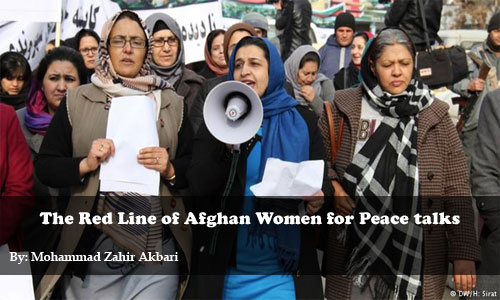Peace talks with Taliban have raised deep concerns among many ordinary Afghans, particularly women, against whom many restricted rules were imposed by the Taliban when the group was in power in Afghanistan nearly two decades ago. When they took over the power in 1995, women were the first group who were put in cage depriving from social and educational activities. Schools got to be merely for boys and no woman could step out except she was fully covered until ankle-length Hijab. They were not allowed to work and they were only like dolls behind walls. On Sunday Women’s rights activists reiterated the call on the Afghan politicians to highlight the protection of civil liberties and human rights as the red lines when talking peace with the Taliban. Suffered by decades of war and violence, the Afghan women are now hoping that the peace talks between the Taliban and other parties involved in the conflict should not compromise on the achievements the country has made in its strides towards democracy the and rule of law.
Though women have lost too many of their relatives in the long continued war, they fear that a peace that empowers the Taliban may repeat a new challenge on women, and they want the negotiators not to forget them. They frequently stressed that the role of Afghan women should be visible in the peace talks and they are not interested to see the return of an Islamic emirate of the Taliban. Muzhgan Sadat, an Afghan woman who on the demand of her family dressed as a male and named as Suhrab to work for her family when the Taliban regime was in power in Afghanistan, as quoted she left school and her family changed their living place in order to keep her gender a secret. She said that during those days when the Taliban were forcing people to go to the mosques for praying, she stood among the worshippers besides her father, but when Taliban fighter became suspicious, she escaped from inside the mosque.
According to experts, there is a direct link between women’s education and violence but during Taliban the women were not allowed to go to school or university. Liberty, equality and democracy did stop at that time and gave way to fundamentalist, sexist, prejudice and systematic violence. Dignity for women was defined: to stay hidden and protect themselves from strange gazes. The socio-political functions of women had been cut to zero. Sadat spent four years in the male getup. “It is painful to imagine returning to those days,” she said. “I advise the families, if those days returned, they should stay at home. I advise the girls not to come out of their homes and do not dress in male outfits, because in that case, one forgets herself. For four years, you desire to put nail color or you want to comb your hair, you want to wear the dress other girls wear, but when you cannot do all that, you take all your desires to grave,” she explained.
Other women are also concerned due to the reason that leaders demand changes to the Constitution of Afghanistan which also involves women’s rights and other civil liberties and the establishment of a Taliban-style governance system which is not acceptable. In previous month, at least 700 women from around the country attended women’s national conference on peace in Kabul and released a 15-article declaration which reflects their stance on the peace. A ceasefire between the warring parties making a sustainable peace, preserving the achievements of the past 18 years, enforcing the law against strongmen, fighting corruption and supporting the Afghan armed forces were part of the declaration. The declaration calls on the warring parties to immediately announce a ceasefire and continue peace talks.
Sahra Karimi, a filmmaker, who completed her education while she was abroad as a refugee, said women in Afghanistan will never allow the return of the Taliban’s emirate. “I totally disagree with bringing a change in the system, because we passed through a long journey towards democracy. Today, democracy at some extent has been institutionalized and we offered major sacrifices for it,” said Karimi. “Suppose if women attend the (Qatar) meeting, one of the red lines will be on the nature of the system which should be established in Afghanistan,” said Shah Fareed, a university lecturer. “The woman wants to protect the present system and the Constitution because they foresee their interests in it. The women will not have any problem with the return of the Taliban if they endorse the Constitution.”
Given the persistent concerns, the government has repeatedly assured women that their rights will not be affected negatively in peace deal with Taliban. As the Afghan governments are not directly involved in the peace process its pledges could not mitigate their concerns. However, American officials hope to persuade the Taliban to sit down with Afghan officials, who they have so far refused to do, and issues like the Constitution, which guarantees women’s rights, would be on the table then. Women comprise half of the society, and more vulnerable by Taliban. Hence, their rights and freedom must not be dealt at any cost. The government is responsible to safeguard all democratic values including the women rights and freedom of expressions have been attained within last 18 years by sacrifices of numerous national security forces.
Home » Opinion » The Red Line of Afghan Women for Peace talks
The Red Line of Afghan Women for Peace talks
| Mohammad Zahir Akbari

